
Surfing as we know it today is possible thanks to the pioneering work of a Catholic priest.
The University of Notre Dame professor Fr. Julius Nieuwland inspired the invention of neoprene, the synthetic rubber used for wetsuits, which enables 21st-century surfers to fend off the cold as they accomplish their feats.
Catholicism’s connection to surfing runs deeper now thanks to Guido Schäffer, a Brazilian medic and seminarian known as the “Surfer Angel.”
A handsome young man with a big smile and a passion for surfing, Schäffer had a short but intense spiritual journey.
He had planned to marry and pursue a medical career. But when he attended a retreat organized by a Catholic charismatic community, he was struck to the heart by a Bible verse: “Do not turn your face away from any of the poor, so that God’s face will not be turned away from you” (Tobit 4:7). In response, he prayed: “Jesus, help me care for the poor.”
Schäffer began to work alongside the Missionaries of Charity, offering medical care to the homeless. He also started training for the priesthood, while continuing to enjoy his favorite recreation.
While out in the waters of Rio de Janeiro in 2009, Schäffer was struck in the back of the neck by his surfboard and drowned. He was just 34.
His sainthood cause opened in 2015, and on May 20 this year, Pope Francis declared him Venerable, meaning he is just one step away from beatification.
What does the move mean to surfers? Are there spiritual benefits to surfing? And does the sport need its own dedicated patron saint?
The Pillar asked Fr. Donald Calloway, the vicar provincial and vocation director of the Marian Fathers in the United States, and one of the world’s most prominent surfing priests. Although he lives some way from the ocean in Steubenville, Ohio, he travels frequently and tries to fit in a morning’s surfing whenever his duties permit.
The conversation is below. It has been edited for length and clarity.
What do you think of Pope Francis’ decision to declare Guido Schäffer Venerable?
I think it’s fantastic because it shows you that even ordinary things like surfing can be a part of a holy person’s life. He wanted to be in the medical field and to do so many normal things in life but was willing to give all that up to respond to a call to be a priest. And then, his love for the poor: It’s just really inspiring.
To be declared a Venerable means your virtue has to be proven true. I’m sure that if we asked him “What did you prefer: God or surfing?” he would say “God, of course.”
It’s fascinating that we’re getting right now a lot of modern saints that people can identify with, like Blessed Carlo Acutis, the saint in sneakers who loved computers. And now we’ve got this Brazilian surfer who’s possibly going to be raised to the honors of the altar. It just shows you that the ordinary, when done with good intentions, can be something that is pleasing to God.
Guido Schäffer had told friends he’d like to die in the sea, where he felt God speaking to him through nature. What do you make of his death?
I have to say, as a surfer, it’s kind of scary. When you’re out there in those elements, you could get hit by your board, which is what happened to him. A lot of people don’t think about that. They think, “Oh, it’s just a little toy.” No, it’s a very hard object. And if you get hit with it, you could die.
It’s very sad and tragic, of course. But at the same time, it just goes to show we don’t know the day or the hour, and you always have to be living close to God because something tragic like that could happen.
The world might look at it and say, “Well, that’s unfortunate. He didn’t get to become a priest.” OK, but you don’t have to be a priest to be holy. You can just be doing your ordinary duties or recreation, and that’s pleasing to God.
A lot of people tend to think, “If I don’t do this, or if I don’t do that, I’m not going to be pleasing to God or be holy.” No, you have the goal in mind, but sometimes it doesn’t happen, and that’s OK.
If you’re living in a state of grace, like this hopefully soon-to-be Blessed, just keep doing what you’re doing. Keep surfing. Leave it to divine providence.
His official biography quotes a priest who said that one of his main attributes was his ability to accept when people said no to his ideas. He had a gift for accepting that his plans weren’t God’s plans.
Wonderful. What’s interesting, too, is that the sport of surfing has always been dominated by the USA, especially Hawaii, or Australia. But right now, the Brazilians are the new guys that are taking over. They’re really good and they’re dominating it.
Brazil has a lot of Evangelicals who are, I think, trying to get people to come to their churches and leave the Catholic Church. I really hope that word of him gets out, and on the beaches, in Copacabana and all these other places, that they can look to him and his life and see a young man who was super Catholic and surfed, and turn to him and realize that maybe they should think twice about leaving the Church and ask his intercession.
I think divine providence is at work with the Brazilians now really dominating the sport of surfing globally. And now you have him, who is going through the ranks of sanctity in the Catholic Church.
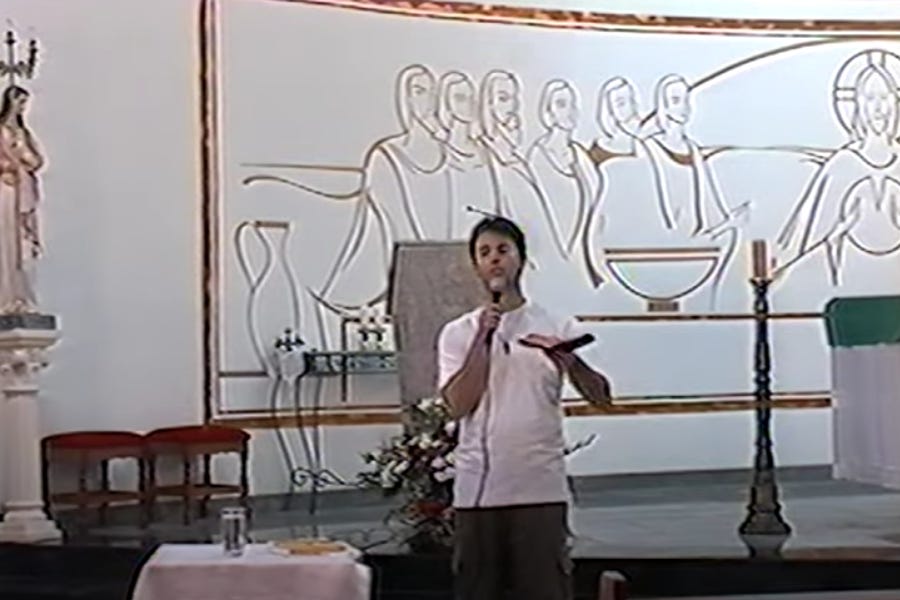
His spirituality was quite marked by the charismatic movement. So in a way, he’s showing that you don’t have to leave the Catholic Church to experience charismatic spirituality.
The official prayer of Guido Schäffer’s cause says that he teaches us “to throw ourselves into the sea of faith.” Do you think that surfing offers a helpful image of the life of faith?
It does. A lot of surfers, even if they’re not religious, they call their surfing spot their “church.” They call the barrel “the green cathedral.” And they’re very “pious” about what they do. They’re very regimented, basing their whole life around it.
And there is something about the sea that is almost everlasting. It seems eternal. The waves never stop crashing on the beach. And when you’re at the sea, you kind of regain your youth. It’s almost like a fountain of life, so to speak. You can go there and it mesmerizes you. You can stare at it for hours and you never really want to leave. You don’t want to be taken away from that because there is no end when you look out.
The philosopher and theologian Peter Kreeft has actually written three books on surfing. He looks at it from a philosophical perspective. One of them was called “If Einstein Had Been a Surfer”, and the others are “The Sea Within” and “I Surf, Therefore I Am.” That’s a trilogy of books on surfing and spirituality.
There’s some depth there. And I mean, look at our Lord. He retreated to the Sea of Galilee. He walked on the water. He called his apostles who were fishermen. Jesus himself loves the sea. He made it.
You’ve described Jesus as “the ultimate surfer.” Why is that?
Well, he doesn’t even need a board. We finite beings need something to stand on. But he doesn’t need that. He can walk on it, and he has.
I’ve often thought to myself — and this is just me and my surfing mind here — did the Holy Family ever take any outings as a family and go to the Sea of Galilee? Because it’s not terribly far from Nazareth and the path to walk there is still there to this day.
Did Joseph maybe make a little boat or something that would float on the water? Would Jesus have taken that little boat made by St. Joseph and had it ride the waves when they were coming in? Would he have maybe even thrown a leaf or something on the waves and watched it come in with those crashing waves? Who knows? But it’s fascinating to think about.
In 2013, Bishop Larry Silva of Honolulu, Hawaii, wrote a pastoral letter to surfers. He said that “there is a tendency in surf culture to see surfing as a religion, to settle for creation rather than Creator.”
Is the challenge for Catholic evangelists to help surfers see that there is a divine horizon beyond the ocean?
Most of my friends who are surfers, they’re not Catholics. They’re not Christians of any kind. But they know that there’s something spiritual about the experience.
When I’m out there, I’m just another guy with a wetsuit on. They don’t know who I am. But once we start talking and they realize that I’m a priest, they are fascinated by that and they want to talk.
It’s kind of funny because sometimes they actually want to be close to me in the water because they think that somehow I’m going to be favored in all the waves, even though they don’t believe in God.
There’s something to be said about a surfer having a great respect for the creation. And when you can take it to the next level of “Well, who made these waves? Who made this ocean?” — if that can happen, you’ve got somebody who is delighting in God’s creation and rejoicing and giving thanks for it. And that’s a wonderful thing.
Bishop Silva said the surfing could also inspire altruism, giving the example of Eddie Aikau, a Hawaiian lifeguard and surfer who “heroically sacrificed his own life” attempting to save people stranded at sea.
Is surfing a recreation that can build a deep sense of fraternity?
Most definitely. There is a tradition in surfing that when somebody in your “tribe” — like your crew — dies, or even somebody that you didn’t know but you knew surfed in your local area, they have what’s called a paddle-out.
They will paddle out into the water in memory of this person. They will gather in a circle. Generally, they’ll bring a flower and they’ll place it, and then everybody in the circle goes around and says something about the person. And then they splash. It’s almost like a little ritual of giving thanks for this person’s life.
And then sometimes the surfers even will help out with the family. If that means that the wife is now a widow or there are children, they take up a collection to help out. That’s really generous.
Also, surfers are known to be environmentally conscious. They’re very much aware of not trashing the beach, not trashing God’s creation. I know a lot of surfers who, on a daily basis, surf, and on their way back to their car they pick up at least one piece of trash to throw away. That’s going out of themselves and looking after something that others can enjoy.
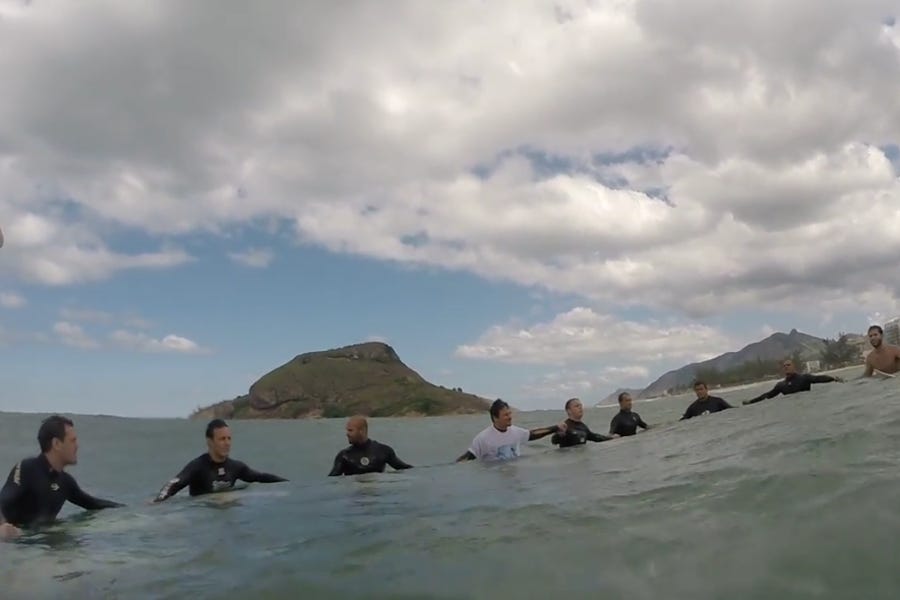
Bishop Silva also said there is a dark side to the surfing scene, noting that it “can sometimes be a self-absorbed sport,” and is associated with “drugs, partying, hedonism, and immodesty.”
Unfortunately, that’s true. I think it was probably more true back in the 80s, when surfing had that kind of stoner feel to it. But today, surfers are some of the best athletes in the world. You have to be in shape. You can’t really be drinking, and smoking marijuana and stuff. All of the pro surfers are in the best shape you could possibly imagine.
But there is the danger of being self-absorbed. What I mean by that is, if you’re a surfer, you can become so preoccupied with catching that perfect wave, chasing the perfect swell, that relatives could need your care and family members need your attention, but you’ve bought that latest ticket to Indonesia or Costa Rica to go surf for three months, and you’re not there for your family.
Professional surfers oftentimes have a wife and children that they rarely see because they’re on the world tour circuit and they’re never home. They’re just living for that high of surfing and it does become very selfish, especially for big wave surfers.
Every time they go out, big wave surfers are putting their life on the line. It’s almost like climbing a mountain without any equipment. It’s really, really imprudent and dumb because you’re going to make your wife a widow. And why? For a thrill? So, there is a certain aspect to it that is very self-absorbed.
That raises interesting questions about Catholic teaching on prudence. What should be the limits of surfing? You seem to be saying it depends on your state of life.
Even if you’re single, [big wave surfing] is probably dumb. You’ve got a mother somewhere who loves you, you know.
What has surfing given you?
Obviously, I don’t do it as much as I used to, but it helps me to stay in shape and that’s a good thing. I don’t want to be unhealthy. I’m always aware that if you want to surf sometime soon, you don’t just show up at the beach and all of a sudden you’re in perfect shape and you're able to do it. You have to prepare. You have to eat well. You have to live somewhat of a disciplined life.
Yes, surfing is about getting good waves, but it’s also about the experience. There is a real brotherhood, fraternity, and fellowship with the people that you surf with. There might not be waves that day, but just sitting in the water, talking to people, running your hand through the water as you’re just sitting there, seeing dolphins swim by… it takes you away from the worries that are on shore.
There really is something transformative about it where it is, I think, God’s de-stressing pool. Because you’re not thinking about the work to be done or all the things that are waiting for you when you get back on land.
Perhaps it’s tapping into what Fr. Jean Pierre de Caussade called the “sacrament of the present moment.” You have to be truly there when you’re doing it, otherwise disastrous things could happen.
Yes, that’s right. It’s a funny thing too, though, that while you’re enjoying it and you have so much peace, you always do have a sense of “I can be eaten at any second,” because you’re in an element that’s not really natural to you.
We’re baptized with water. God uses it to save us. But at the same time, we could be drowned. We could die by that same water or be eaten by a creature that’s just a few feet below us in an instant.
So there’s something that is so peaceful about it, and at the same time, every true surfer will tell you it’s always on their mind: This could be the last time.
The patron saint of surfing is said to be St. Christopher, the 3rd-century martyr. He is also patron of travelers and bachelors, among many other titles.
Would it be good to have a new patron saint of surfing who took part in the sport?
I think so. Why not? St. Christopher didn’t himself surf. But this is what this new Venerable did.
Would Guido Schäffer be an ideal candidate for the position if he’s eventually made a saint?
I think it’d be fantastic, because he’d be a model for people. And it wouldn’t be even primarily about the surfing. It would be wanting to imitate him and his virtue. Because he never won a world tour in surfing or anything like that. But you don’t need to. He just did it because he loved it. But we would want to imitate him in his virtues.



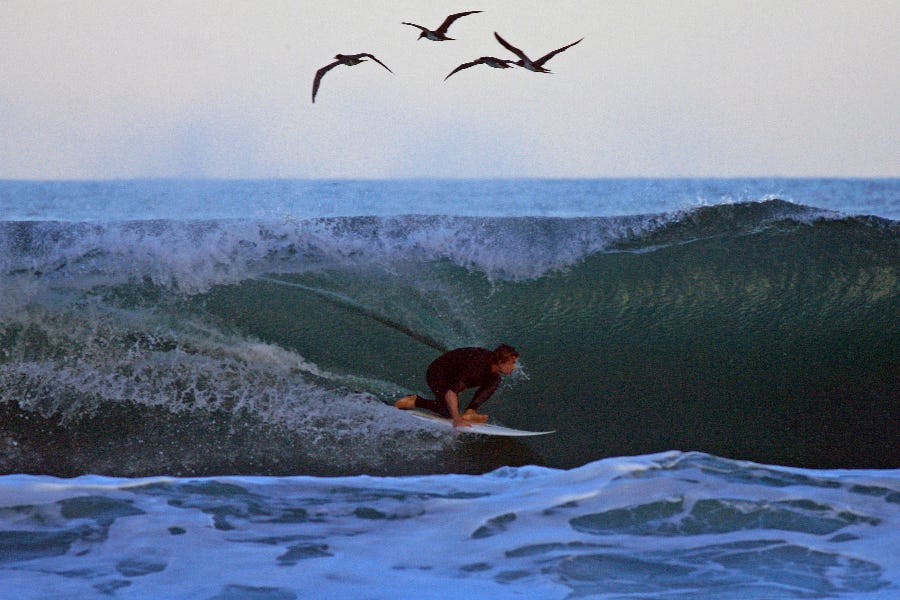
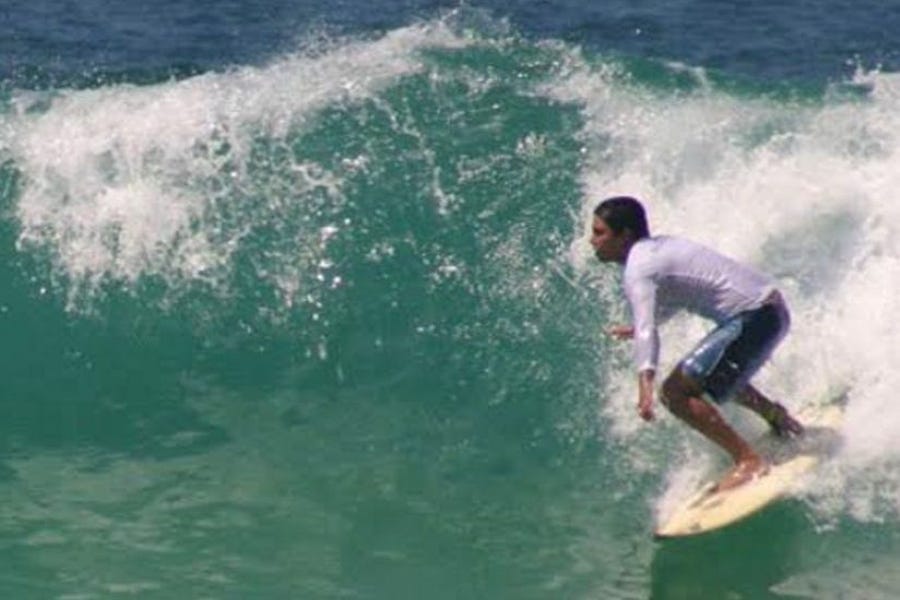
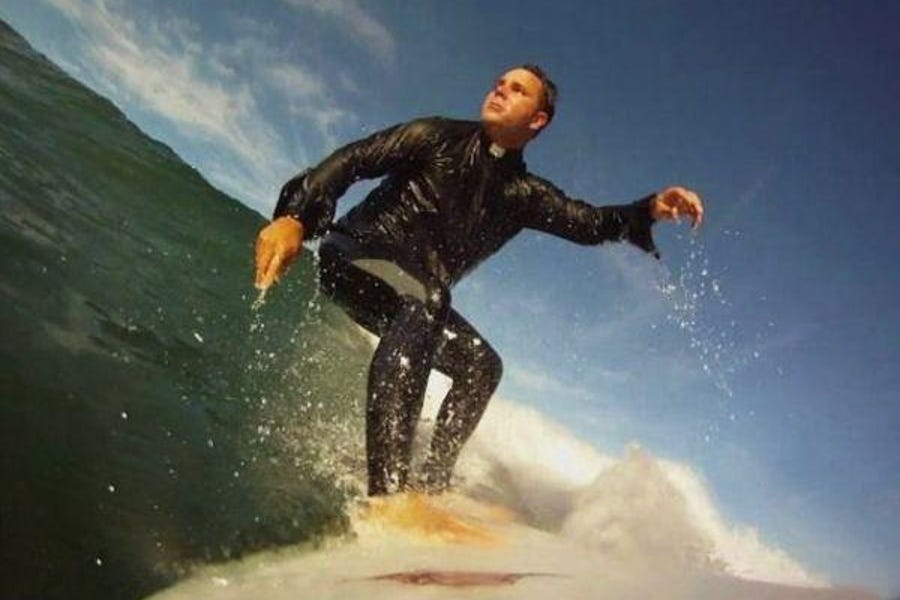
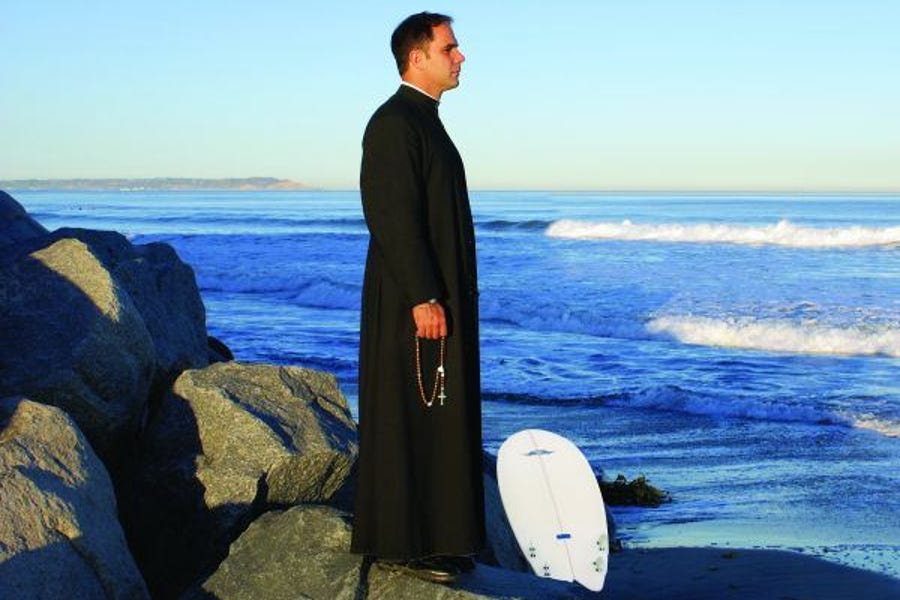




Thanks for this article. Enjoyable!
The answer about state in life seems truncated. When he says “it’s really dumb,” I think he’s talking about big wave surfing still, which he says is super-dangerous in the prior answer.
Otherwise it doesn’t make sense with the rest of the article.